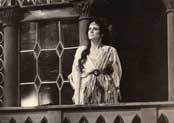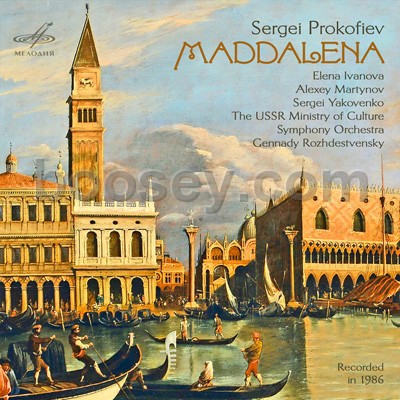OPERNSUCHE

Maddalena
(1911-13)Libretto by the composer based on the play by Magda Gustavovna Liven (R,E)
Major roles: S,T,Bar; minor roles: S,T; off-stage male chorus
3(III=picc).2.corA.3(III=bcl).3(III=dbn)-6.4.3.1-timp.perc(2):
tam-t/cyms/SD/BD/tgl-2harps-strings
Abkürzungsverzeichnis (PDF)
Boosey & Hawkes
BBC Radio 3
Dirigent: Edward Downes
Ensemble: BBC Northern symphony Orchestra
Steirisches Herbst, Graz
Ensemble: Steirisches Herbst
| MADDALENA | Soprano |
| GEMMA, a duenna | Soprano |
| ROMEO | Tenor |
| GENARO, Maddalena's husband | Tenor |
| STENIO, an alchemist | Baritone |
| Chorus of gondoliers (offstage) | Tenors and Basses |
Venice, beginning of the 15th century
A young Venetian girl Maddalena is watching the sunset through an open window as gondoliers sing in the distance. Two friends invite Maddalena for a trip across the lagoon, but she refuses as she is waiting for her husband, a young artist. Genaro returns and the couple embrace, swearing mutual love. The alchemist Stenio knocks at the door and Maddalena hides. Stenio confesses to his friend that he is passionately in love with a mysterious woman who comes to him but will not reveal her identity. He is desparate to know who she is and Genaro promises to help. A storm breaks out and flashes of lightning are seen. Suddenly Stenio becomes aware that someone has been overhearing their conversation. He tears aside a curtain, sees Maddalena and recognises her as his mysterious lover. In the ensuing tumult of rage, both men draw daggers to kill Maddalena, but she mocks them and eventually turns them against each other. Genaro manages to kill Stenio but is himself mortally wounded. He vainly threatens Maddalena and attempts to persuade her to join him in death. But soon he too is dead. Maddalena rejoices in her new situation, ‘alone… alive and free at last!’. After gloating over the two bodies, she calls for help. ‘There was a quarrel! A stranger killed my Genaro!’
Written at the age of 20, while studying as a postgraduate at the St Petersburg Conservatoire, Maddalena is the earliest Prokofieff opera to have reached the stage. However, it was in fact his fifth operatic work, emphasising how central the theatre was to his creative adolescence between 1900 and 1910. Prokofieff's libretto was drawn from a play by Baroness Magda Liven, which bears a striking resemblance to Oscar Wilde's A Florentine Tragedy. Its verismo plot describes a love triangle in which the femme fatale emerges as the victor to celebrate her liberation from her male lovers. The work is Prokofieff's most traditionally Romantic opera, including an extended love scene and a sequence of dramatic coups de théâtre. When hopes of performance in St Petersburg faded, the composer abandoned the orchestration, while retaining an affection for the work, describing it as "a chocolate with an expensive liqueur inside". The orchestration was completed in the 1970s by Edward Downes, allowing the opera's belated stage premiere.
Dramatic, Romantic

Elena Ivanova/Alexei Martynov/Sergei Yakovenko/Natalia Koptanova/Victor Rumyantsev/USSR Ministry of Culture State Symphony Orchestra, USSR Ministry of Culture Chamber Choir/Gennadi Rozhdestvensky
Melodiya SUCD 10-00053 (released also as Olympia OCD 215)
